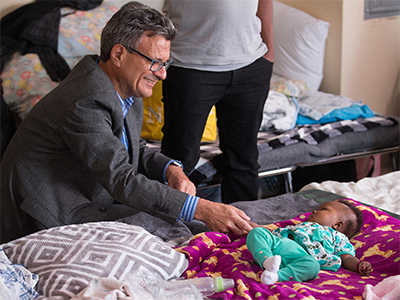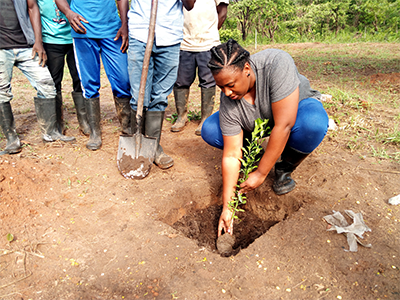Which of these three, do you think, was a neighbor to the man who fell into the hands of the robbers? Luke 10:36 (NRSV)
When Jesus was asked, "who is my neighbor," he answered with a story. The man who asked the question seemed more interested in what he needed to do to merit eternal life than he was in loving his neighbors. While he could recite the law – that God commands us to love our neighbors as we love ourselves – he was hoping for a reasonable limitation to the generosity of his outreach.
 |
| Thomas Kemper of Global Ministries visits with Luciane Charles, from Haiti, at Christ Ministry Center in San Diego. The church has been helping waves of immigrants since 2011, when it was reborn as an immigration center. Photo: Mike DuBose, UMNS |
Jesus turns the definition of "neighbor" upside down when he tells the story of the Good Samaritan. What makes a person our neighbor is not that he or she lives close by, is a member of our faith community, or even whether we know the person at all. Jesus defines neighborliness as an action motivated by love, available to anyone and everyone we encounter who is suffering. If we recognize the need, we are called by God to respond as a neighbor. Jesus makes the "neighbor" all who heard the parable – all of us.
The United Methodist Committee on Relief has answered God's call to be a neighbor for nearly 80 years. Thomas Kemper, Global Ministries' general secretary, describes UMCOR's 1940 founding as "a powerful Wesleyan tradition of concern for the vulnerable."
Your gifts on UMCOR Sunday helps support lay the foundation for the United Methodist Committee on Relief (UMCOR) to share God's love with communities everywhere.
Today, UMCOR continues this tradition in work with immigrant communities and refugees globally. In the past year, UMCOR has supported partners in Iraq, Syria, South Sudan, Armenia, Bangladesh, the Philippines, Ecuador, Haiti and Nicaragua, among others. Along the U.S. and Mexico border, UMCOR grants assist U.S. churches and partners addressing migrant needs on both sides of the border.
Last year, the Democratic Republic of the Congo experienced conflicts and land disputes that displaced people across the country. East Congo, which has endured prolonged periods of conflict since 1996, hosts millions of displaced people. United Methodists in Uvira shelter about 2,500 people who fled the latest outbreaks of violence. Central Congo experienced conflicts as well, particularly in the Kasai region. UMCOR approved solidarity grants so that all four DRC United Methodist episcopal areas can meet the needs of displaced populations.
 |
| Missionary Lorraine Charinda demonstrates how to plant a lemon tree at the Kamisamba farm and training school, North Katanga, DRC. Photo: Alex Kibombe. |
After Hurricane Andrew in 1992, UMCOR ramped up its ministries for U.S. disaster response. While Andrew was the strongest storm to hit the U.S. in decades, today's superstorms are often larger, cause more damage and occur more frequently. Training disaster response teams in U.S. episcopal areas allows UMCOR to respond alongside conference teams and churches in every state. Although news about disasters fades quickly, UMCOR programs provide multiyear, phased support for storm survivors. Case management, in which individuals and families are served by trained counselors on a case-by-case basis, helps survivors recover in ways that fit their unique circumstances.
Smaller, lesser-known storms may also require UMCOR to respond as a trusted neighbor. The disaster response team of the Greater New Jersey Conference worked with Ocean County United Methodists to apply for an UMCOR grant, which helped with building materials, appliances, and funds for licensed contractors.
In January 2019, Global Ministries hosted an agricultural summit in South Africa with agricultural missionaries and representatives from African annual conferences.
In the words of Bishop Herbert Welch, UMCOR was founded for "the relief of human suffering without distinction of race, color or creed." Today, UMCOR affirms that commitment, addressing the needs of unserved and vulnerable populations while maintaining the dignity of survivors. Well-implemented humanitarian assistance from a faith-based relief agency can be a real and tangible sign that God loves all people.
Christie R. House, senior writer and editor, Global Ministries.
One of six churchwide Special Sundays with offerings of The United Methodist Church, UMCOR Sunday calls United Methodists to share the goodness of life with those who hurt. Your gifts to UMCOR Sunday lay the foundation for the United Methodist Committee on Relief (UMCOR) to share God's love with communities everywhere. The special offering underwrites UMCOR's "costs of doing business." This helps UMCOR to keep the promise that 100 percent of any gift to a specific UMCOR project will go toward that project, not administrative costs.
When you give generously on UMCOR Sunday, you make a difference in the lives of people who hurt. Give now.





